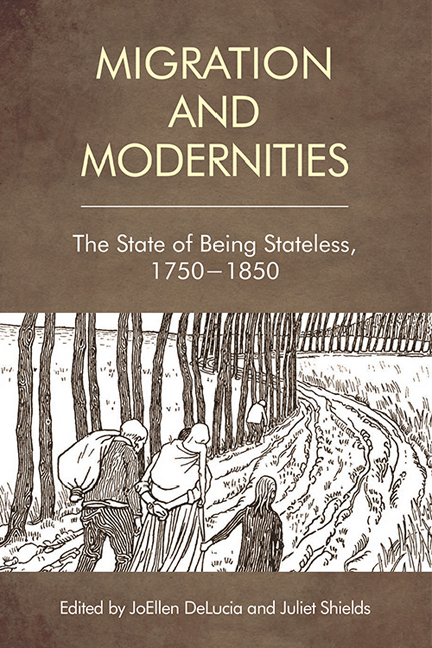5 - “An Alien to my Country”: Migration and Statelessness in Frances Burney’s The Wanderer
Published online by Cambridge University Press: 05 May 2021
Summary
Frances Burney's final novel, The Wanderer (1814), opens with the eponymous wanderer, the disguised English aristocrat Juliet Granville, who becomes known by the assumed name Ellis, attempting to cross the English Channel to escape the French Revolution. This geographical position points to her marginalization throughout the novel:
During the dire reign of the terrific Robespierre, and in the dead of night, braving the cold, the darkness and the damps of December, some English passengers, in a small vessel, were preparing to glide silently from the coast of France, when a voice of keen distress resounded from the shore, imploring, in the French language, pity and admission.
Ellis first appears as a genderless, classless, and bodiless voice, recognizable only – though incorrectly – in national terms, as French. Ellis is, indeed, an emigrant fleeing revolutionary France; however, she also becomes an internal refugee in her native Britain over the course of Burney's novel. Unaccepted by the lands of her birth and upbringing, Britain and France, Ellis is stateless, trapped between unreformed and revolutionary regimes.
The liminal place Ellis occupies in the novel's opening, however, also suggests her ability to cross borders and test out “imagined … communit[ies],” to explore their affective draws and their failings; her geographical movement and downward socio-economic mobility expose her to different ways of life, expanding her social sympathies and allowing her to critique Britain from an outsider's perspective. Ellis's movement in the novel resembles what James Buzard describes as autoethnographic fiction’s
dislocation of British culture and identity from Britain to some position outside from which that culture might be repatriated, restored or “returned” to people who have never yet known it, being as they are mere insiders, the occupants and prisoners of locations.
Both an English aristocrat restored to her homeland, family, and rank over the course of the narrative and an émigré without an identifiable name, class, or even ethnicity for much of the text, Ellis occupies a unique inside-outside position with respect to Britain's political and socio-economic systems that permits her to cultivate simultaneous sympathy for and critical distance from her homeland.
- Type
- Chapter
- Information
- Migration and ModernitiesThe State of Being Stateless, 1750–1850, pp. 125 - 149Publisher: Edinburgh University PressPrint publication year: 2018



